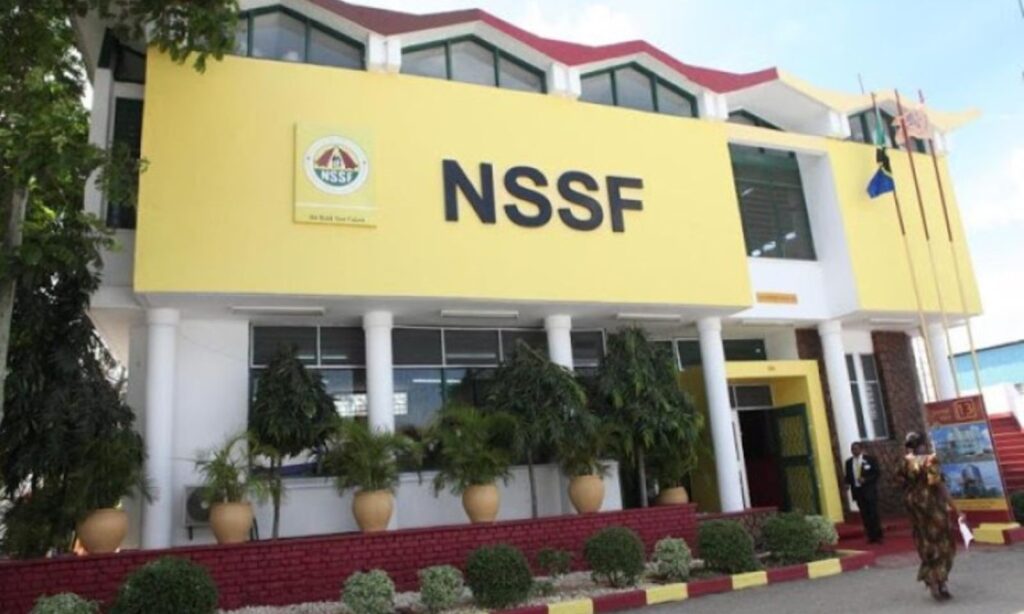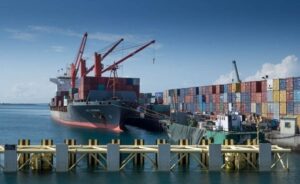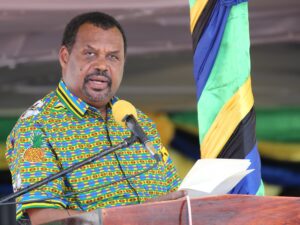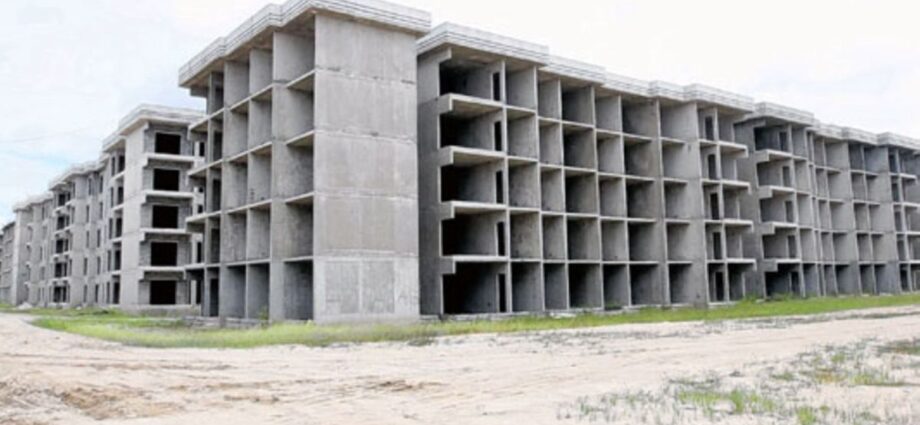Tanzania’s National Social Security Fund
What you need to know about Tanzania NSSF:
The National Social Security Fund is the government agency of Tanzania responsible for the collection, safekeeping, responsible investment, and distribution of retirement funds of all employees in all sectors of the Tanzania economy that do not fall under the governmental pension schemes.

PHOTO: The National Social Security Fund is a friendly service organization that exists for the public good. It offers social protection to all workers in Tanzania, in the private sector.
 Dege Eco Village was marketed as the ultimate solution to the real estate woes in Dar es salaam. But, behind the scenes, Dege was an audacious scheme to defraud NSSF contributors out of hundreds of billions of shillings.
Dege Eco Village was marketed as the ultimate solution to the real estate woes in Dar es salaam. But, behind the scenes, Dege was an audacious scheme to defraud NSSF contributors out of hundreds of billions of shillings.It all began in November 2013 when Azimio approached NSSF, claiming to possess sites suitable for the development of satellite cities and thus requesting NSSF to finance the projects. The two organisations agreed to undertake multiple real estate development projects together.
Barely two months later, Dege was unveiled at the site where Azimio claimed to have 20,000 acres. With 7,460 apartments scattered across 300 acres, Dege was the second-largest real estate complex in Africa. It was dubbed a “heavenly place”, providing all the amenities that modern middle- and upper-income people would expect. But, for the majority of low-income Tanzanians putting their money into NSSF, Dege was a hellish inferno.
The anticipated cost was Sh1.4 trillion, with NSSF paying 45 percent and Azimio funding 35 percent in cash plus the value of the land, taken at 20 percent.
The details were shocking.
For starters, the value of land was highly inflated. While many people acquainted with Kigamboni would agree that an acre cost less than Sh10 million in 2013, NSSF eventually valued it at Sh25 million. However, in the NSSF-Azimio agreement, the value of the 300 acres given by Azimio was set at Sh800 million each! With one daring manoeuvre, the swindlers swiped Sh233 billion from NSSF, using NSSF valuation.
NSSF was an eager participant in this scam. They performed no due diligence. They performed no valuation. They conveniently ignored that NSSF owned substantial tracts of land in Kigamboni valued at just Sh4.5 million per acre. Ultimately, despite the fact that Azimio does not possess 20,000 acres in Dege, and its ownership of the 300 acres is questionable (according to one source, the title deed is nowhere to be seen), NSSF ignored all that. The affair was quite blatant – the perpetrators did not even bother to mask their misdeeds.
There was a time when I was so taken by NSSF’s outward appearance that I thought it was a very well run organisation. There are so few success stories to go around in Tanzania, so it is easy to fool people with an appearance of success. But mounting evidence suggests that something was seriously wrong with NSSF at a certain point in the last decade. Dege is just the tip of the iceberg.
But the horror show was only beginning.

Tanzanians are well acquainted with this type of corruption. A classic example is the controversial NSSF Ubungo warehouse saga. In the Dege case, nothing would have stopped Azimio from taking a bigger chunk of the Sh1.4 trillion or more if it had not been for the Magufuli factor.
In this affair, NSSF did not need Azimio to carry out the Dege project. NSSF had both land and money to invest in Kigamboni. It is also clear that Azimio had nothing to offer NSSF apart from empty words. It is no surprise that Dege was inexplicably abandoned barely two months after Magufuli became president. Given the illegality of the enterprise, it is understandable that they had to run for cover when someone that was not part of their plan came to power.
Strangely, though, no one has had their day in court.

With regard to social security funds, Dege is not an exception. There are many reports of corruption, majorly via poor investment of their resources. That highlights the issue of their accountability to their contributors.
That is the argument that Prof Lusuga Kironde, a columnist for The Citizen, made in one of his recent articles. The professor observed that all NSSF board members are appointed by either the president or the minister. So, what is the role of the contributors? As long as social security funds are viewed as an extension of the government, the funds will continue to be subjected to the grand corruption pervasive among the political elites.
Finally, given the recent announcement by NSSF that it wishes to sell its Dege assets, Tanzanians should be extremely wary of this move. Given the cash investments, using the valid land valuation, Azimio owns only 7 percent of the shares. As a result, there is a strong case for NSSF to acquire the remaining Azimio shares obtained through fraud and proceed with the project as planned. Otherwise, it is unlikely to recoup its investment this way.
Furthermore, since NSSF allowed barely three weeks for bids on a Sh1.4 trillion project to be submitted, with a guarantee of 25 percent of the bid price, isn’t this a backdoor for the fraudsters to retake control of the project? According to one scholar, “what is likely to happen is that the award will be given to a company we have never heard of, representing the interests of the very persons behind the current Dege scheme”.
The Dege fiasco is far from over.
Watch this space:
Share this news
This Year’s Most Read News Stories

Tanzania Confirms Outbreak of Marburg Virus Disease
Dodoma — Tanzania today confirmed an outbreak of Marburg virus disease in the northwestern Kagera region after one case tested positive for the virus following investigations and laboratory analysis of suspected cases of the disease.
President of the Republic of Tanzania, Her Excellency Samia Suluhu Hassan, made the announcement during a press briefing alongside World Health Organization (WHO) Director-General, Dr Tedros Adhanom Ghebreyesus, in the country’s administrative capital Dodoma.
“Laboratory tests conducted in Kabaile Mobile Laboratory in Kagera and later confirmed in Dar es Salaam identified one patient as being infected with the Marburg virus. Fortunately, the remaining suspected patients tested negative,” the president said. “We have demonstrated in the past our ability to contain a similar outbreak and are determined to do the same this time around.”
A total of 25 suspected cases have been reported as of 20 January 2025, all of whom have tested negative and are currently under close follow-up, the president said. The cases have been reported in Biharamulo and Muleba districts in Kagera.
“We have resolved to reassure the general public in Tanzania and the international community as a whole of our collective determination to address the global health challenges, including the Marburg virus disease,” said H.E President Hassan.
WHO is supporting Tanzanian health authorities to enhance key outbreak control measures including disease surveillance, testing, treatment, infection prevention and control, case management, as well as increasing public awareness among communities to prevent further spread of the virus.
“WHO, working with its partners, is committed to supporting the government of Tanzania to bring the outbreak under control as soon as possible, and to build a healthier, safer, fairer future for all the people of Tanzania,” said Dr Tedros. “Now is a time for collaboration, and commitment, to protecting the health of all people in Tanzania, and the region, from the risks posed by this disease.”
Marburg virus disease is highly virulent and causes haemorrhagic fever. It belongs to the same family as the virus that causes Ebola virus disease. Illness caused by Marburg virus begins abruptly. Patients present with high fever, severe headache and severe malaise. They may develop severe haemorrhagic symptoms within seven days.
“The declaration by the president and the measures being taken by the government are crucial in addressing the threat of this disease at the local and national levels as well as preventing potential cross-border spread,” said Dr Matshidiso Moeti, WHO Regional Director for Africa. “Our priority is to support the government to rapidly scale up measures to effectively respond to this outbreak and safeguard the health of the population,”
Tanzania previously reported an outbreak of Marburg in March 2023 – the country’s first – in Kagera region, in which a total of nine cases (eight confirmed and one probable) and six deaths were reported, with a case fatality ratio of 67%.

Sign up for free AllAfrica Newsletters
Get the latest in African news delivered straight to your inbox
In the African region, previous outbreaks and sporadic cases have been reported in Angola, the Democratic Republic of the Congo, Ghana, Kenya, Equatorial Guinea, Rwanda, South Africa and Uganda.
Marburg virus is transmitted to people from fruit bats and spreads among humans through direct contact with the bodily fluids of infected people, surfaces and materials. Although several promising candidate medical countermeasures are currently undergoing clinical trials, there is no licensed treatment or vaccine for effective management or prevention of Marburg virus disease. However, early access to treatment and supportive care – rehydration with oral or intravenous fluids – and treatment of specific symptoms, improve survival.
Source: allafrica.com

Zanzibar: Containers and dhows carrying alcohol stuck at Malindi Port
ZMMI, Scotch Store and One Stop Company have filed contempt of court case against Nicholas Eshalin, the chief executive officer of the Zanzibar Multipurpose TerminalContinue Reading

ZSSF money not for projects, says Ali Karume
Unguja. Veteran politician and diplomat Ali Karume has called on authorities of the Zanzibar Revolutionary Government (SMZ) to refrain from using the Zanzibar Social Security Fund money for establishing commercial projects.Continue Reading











